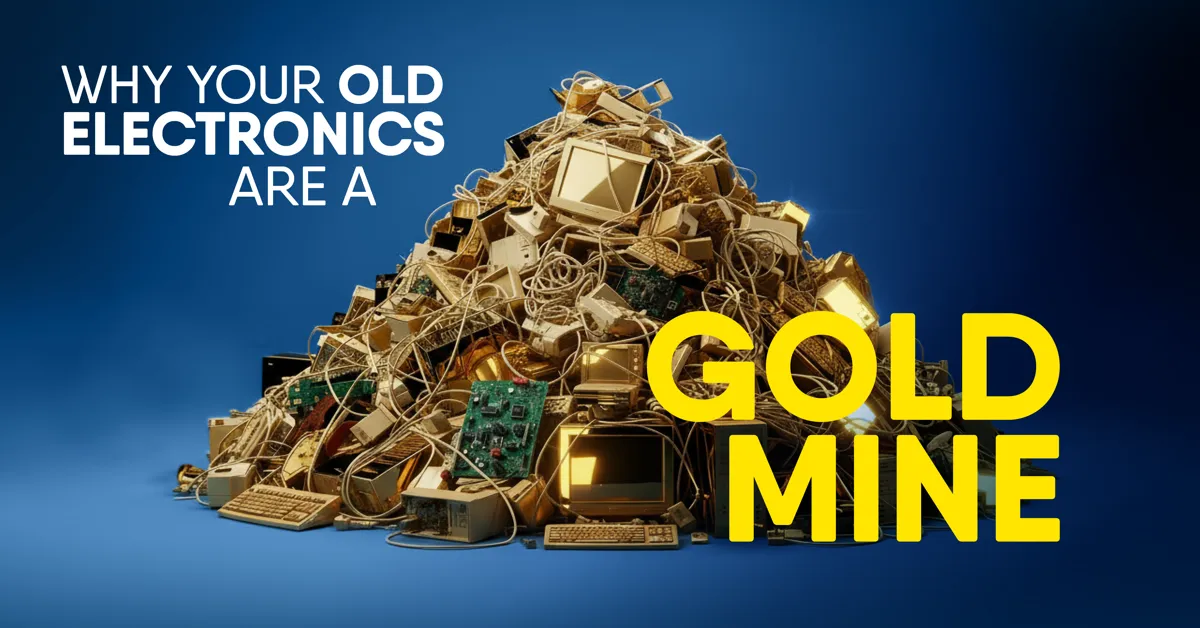CHOOSE
A DIFFERENT TERRITORY

For centuries, gold has symbolised wealth, discovery and innovation. From ancient civilisations to the pioneers of the Wild West, the search for this precious metal has captured human imagination and driven progress.
Listen to this story
Today, you don’t need to dig deep underground to find gold. Many households already have access to a modern-day goldmine – hidden in the old phones, laptops and other electronics gathering dust in drawers and cupboards.
Every year, the world produces around 62 million tonnes of electronic waste (e-waste) - anything with a plug, cable or battery. Yet less than a quarter of it is recycled. Alongside plastics and common metals like copper, aluminium and steel, e-waste contains valuable and finite elements such as platinum, cobalt, rare earths – and gold.
While each device only holds tiny amounts of these materials, the scale of global disposal quickly adds up. In fact, a tonne of e-waste can contain more gold than a tonne of mined gold ore, which contains only trace amounts of the metal — often just a few grams of gold mixed into tonnes of rock that must be crushed, processed and refined. Recovering these precious materials through recycling is far more efficient and environmentally friendly than extracting them from the earth. Considering that all the gold ever mined could fit inside a cube just 22 metres wide, every gram recovered makes a difference.
Beyond its financial worth, recovering gold and other precious metals from e-waste supports resource security – reducing the need for new mining and ensuring these critical materials are available for the technologies that power modern life.
Gold is essential to modern electronics. Found mainly on circuit boards, it coats the connectors that transfer signals between components. It’s an excellent conductor, resistant to corrosion and can be stretched incredibly thin, making it perfect for compact, high-performance devices.
As technology continues to evolve – from smartphones and laptops to electric vehicles and smart homes – demand for gold and other critical materials is only set to grow.
Mining gold comes at a cost. The gold industry produces more annual carbon emissions than all domestic European aviation and requires around 265,000 litres of water for every kilogram of gold mined. Small-scale gold mining also contributes to around 38% of global mercury emissions, causing serious environmental and health impacts.
By recycling what already exists, we can drastically cut these emissions, conserve water and prevent pollution – protecting both people and the planet.
Recycling your old devices through the right channels ensures valuable materials like gold are recovered safely and reused in new products. There are several responsible routes for householders to choose from:
By choosing these responsible recycling routes, you’re helping to close the loop and ensure your old technology supports a more sustainable future.
At EMR, we play an important role in this process by accepting small mixed WEEE (SMW) and large domestic appliances (LDAs) from local authorities, take-back schemes and producer compliance schemes.
Our teams and partner network recover high-quality metals and materials that can be reintroduced into manufacturing, helping reduce the need for virgin resources and supporting industries to meet their sustainability goals.
Environmental responsibility is built into everything we do. EMR ensures that every stage of recycling protects people, communities and the natural world.
Recycling your old tech responsibly is a simple but powerful way to reduce waste, recover valuable resources and support a circular economy. For households, this means using approved collection points and take-back schemes. For businesses and industries handling SMW or LDAs, EMR is here to help.
There’s real treasure in your old technology – and recycling it responsibly helps ensure that value is never lost.
Find out what items EMR accepts at emrgroup.com